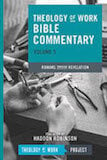Management: Managing Your Closest Relationships (1 Corinthians 13 Sermon Notes)
Sermon Notes / Produced by The High Calling
Text: 1 Corinthians 13:1-7
1 If I speak in the tongues of mortals and of angels, but do not have love, I am a noisy gong or a clanging cymbal.
2 And if I have prophetic powers, and understand all mysteries and all knowledge, and if I have all faith, so as to remove mountains, but do not have love, I am nothing.
3 If I give away all my possessions, and if I hand over my body so that I may boast, but do not have love, I gain nothing.
4 Love is patient; love is kind; love is not envious or boastful or arrogant
5 or rude. It does not insist on its own way; it is not irritable or resentful;
6 it does not rejoice in wrongdoing, but rejoices in the truth.
7 It bears all things, believes all things, hopes all things, endures all things.
Theological Point: In the midst of the section of his letter to the Corinthians about spiritual gifts, Paul changes his tone to theopoetics to describe the “more excellent way” to love one another in the church family. These are not flowery words lacking substance; on the contrary, Paul lays out a lyrical yet gutsy way to love those closest to you. Paul appears to be linking two important concepts: the Body of Christ has both function (spiritual gifts that are like parts of the body: arms, legs, etc.) and an ethos or culture of love that envelops all else. Function alone is pure mechanics without good purposes or loving care. Love, on the other hand, needs functionality to move and express itself in a collaborative fashion through a community of people. And this love of First Corinthians 13 would appear to be the very nature of God who created us in God’s image.
Hermeneutical Connection: 1 Corinthians 13 is often read at weddings because it exemplifies the nature of love and how to express it in close relationships. However, there is also something horrifying in reading this passage because it is a kind of measurement that reveals just how far we fall short of this same love. The preacher will want to be careful with this sermon, serving both as Prophet by encouraging the congregation to excel in love for those in our closest circle of relationships while, at the same time, serving as Pastor to those who will be focusing on their relationship failures. In fact, this tension is generally true in preaching as we lift up the vision of life with Christ and also illuminate the redemption offered to us when we fail to live it. For the purposes of this sermon series, this Scripture serves us well as a mandate for living out (managing) love in our closest relationships.
Introduction: The preacher may want to re-introduce the sermon series here or before the reading of Scripture. These three sermons are about management. We think of management as something that goes on in businesses and involves job descriptions, evaluations, and human resources departments. We’ve suggested, however, that management is about the right ordering of our lives for the best results and meaningful living. These sermons relate to work in that the best way to be an able manager of relationships at work is first to be able to manage one’s self (first sermon) and then to be able to manage one’s closest circle of relationships (sermon two). Then, the management of our colleagues and partners works the best (sermon three). We’ve also suggested that management and love are closely related because, as Christians, we are called to order our lives and conduct them in a loving manner—so, in this sense, to love others means to manage well how we relate to other people.
Illustration: Here are the analogies we used last week to introduce this series: the architect draws up the plans (leadership: casting the vision), but the engineer and contractor actually build it. An author may have dreamt up a fantastic recipe, but the chef is the one who actually cooks it and serves it up. We can talk all we want about Christian love and envision its reality, but at some point we have to strategize about how to actually do love as the Scripture calls us to do. It is belief in action.
This second sermon takes the path similar to the age-old issue from James of the relationship of Faith to Works. Faith without Works is dead. But then, it is by Faith and not Works that we are saved. Similarly, roles and duties without love are rote; but love without roles and duties has no outlet to express itself. [Note 1 John 3:18—loving in deed and truth].
In our last sermon, we looked at ways that we are called to manage ourselves. We suggested that to self-manage well is to self-love well. Today we look at the sphere of those relationships closest to us. You can think of these sermons as three concentric circles: the first sermon focuses on you, the second sermon includes the first but is larger: loving beyond myself to those God has given me for the long term: close friends and family. The third sermon will be even larger than the first two and includes them—then we will look at the sphere of relationships in our larger community of neighboors, coworkers, and other acquaintances.
A. Our Closest Relationships: Just Role-Playing?
Sometimes, in our closest relationships, we wind up just going through the motions. We get into routines and those routines turn into institutions! After a while, a person might wonder: why am I doing all this?
Illustration. [Note to Preacher: while I suggest illustrations along the way, the best ones come out of your own life experiences.] Remember the song “Do You Love Me?” from Fiddler on the Roof ? Tevye asked his wife, Golde: “Do you love me?” And she responded:
“Do I love you?
For twenty-five years I’ve washed your clothes
Cooked your meals, cleaned your house
Given you children, milked the cow
After twenty-five years, why talk about love right now?”
Sometimes it feels that way whether we are husbands, wives, or good friends of others: I love you by playing a role, doing routines, acting the part. But is that enough?
Paul described a wonderfully collaborative way of being the church in 1 Corinthians. [Here the preacher can have some fun: you’re a hand and you’re a foot—you’re an ear and you’re an eye, etc.] The point is to note that we all have a role, a routine, a duty in the church based on our gifts and passion, but Paul didn’t think that was enough.
B. Frou-Frou Love: Just Words?
Sometimes we think that love is purely those wonderful thoughts and emotions that wash over us and make us feel so good—yet may lack substance. “Love” is one of the most tossed around words in the English language and sometimes it seems full of air, floating around aimlessly without any mooring!
William Shakespeare thought of young love in just such a manner. A Midsummer’s Night Dream and As You Like It are two plays that make considerable mockery of young love that seemed so whimsical yet scarcely wise or hardy. Remember Orlando in As You Like It? He was so smitten by Rosalind that he roamed the forest obsessed, hanging verses in trees, even carving them into trees—love poems for the object of his affection. Here is one of his frou-frou lyrics [preacher, have some fun in the way you articulate the poem: it is simple verse and Shakespeare intended it to be hokey and absurd].
ROSALIND
From the east to western Ind,
No jewel is like Rosalind.
Her worth, being mounted on the wind,
Through all the world bears Rosalind.
All the pictures fairest lined
Are but black to Rosalind.
Let no fair be kept in mind
But the fair of Rosalind.
[Act 3, Scene 2].
Sometimes our love is reduced to duties and roles; and sometimes it is empty verbiage without any substance—no real staying power!
Another Illustration: A young woman on an online help forum lamented: “I’m so fed up, I think I’m being used by my friend. I’m always there for her yet she is never there for me. The number of times I have dropped everything and gone to see her and cheer her up . . .yet when I need a friend to talk things through with, she’s not there.”
One of the responders wrote: “This one for me is pretty easy. I was bullied badly at school, but when this happened, my friends would run, and they weren’t there if I needed someone to talk to. But when they needed me, I was there. It hurt because you’re giving all your energy to a person you consider a friend and they’re not giving anything back in return. I think you should be honest and tell her how you feel word for word, and if it is like what happened to me, they will probably flip out and yell and scream, but that is only them trying to cover what they know is true.”
It’s hard when a person plays the role—in this case “friend”—but it feels like there is no substance to the role. And if we want to manage these close relationships well, there needs to be more than the title if we want to keep them strong throughout the years.
C. Love in Word and Deed: Keeping Them Together.
This takes us to our third place in our sermon for today: loving in word and deed. Paul recognized that the Corinthians needed a sense of role and responsibility in the church, but they needed to be immersed in an attitude and ethos of love. To manage these relationships well means that we know both what to do to show love (roles, duties, obligations) but also the spirit of showing that love (I Cor. 13).
So, the best way for me to manage the relationships of those closest to me is both to know the role—brother, husband, friend—but also that I enact the role with love that is patient, kind, not irritable or resentful and so forth. In fact, one could say that, over time, there is the opportunity for a maturing of love.
Illustration: Look at the wonderful description of mature love at http://celebratelove.com/mature.htm. [Link is no longer active—Editors] One way to use this material in the sermon is to quote a salient point from the article. Consider also telling a story when someone really loved you—went beyond the role to touch your life in a way that changed you forever. Someone, perhaps, who took a risk for you or otherwise went a second mile. Mature love grows in the things of 1 Corinthians 13. But here is an important caveat. Mature love also grows in the ability to forgive one another when we do not live up to the things of 1 Corinthians 13. After all, this passage describes a kind of love that is impossible for us to fully embrace and live out.
Conclusion. Preacher: narrow in on your congregation. After a good pause . . .
Before we can be good managers of our larger lives, we must learn to manage ourselves. And before we can manage ably those larger relationships of work and community, we must be well on the road to maturing in our managing of those relationships closest to us.
Let me encourage you not to get this backwards, as is too often the case. Leadership Network of Dallas, Texas recently held a virtual conference featuring the comments from forty seasoned pastors who talked about what they would do over again if they could. A majority of them said they got this one wrong: it was only later in life that they realized they had worked hard to lead and manage their growing, thriving churches only to find those closest to them frustrated and angry.
These pastors reported they paid a high price for this mistake. How about you? Are you managing backwards?
********************************************************************
Dr. George Cladis, Executive Pastor, Liberty Churches, Shrewsbury, MA; Executive Operating Officer, New England Dream Center, Worcester, MA
Click here for a PDF of this sermon.
Other sermons in this series on Management:











